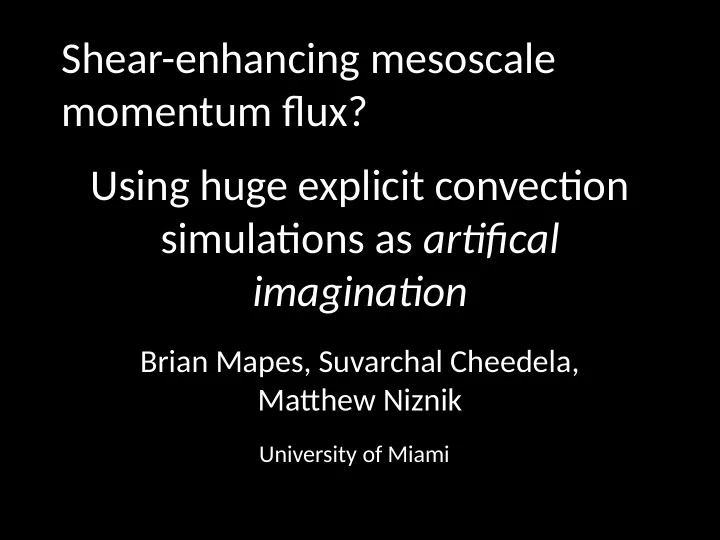

Shear-enhancing mesoscale momentum fmux? Using huge explicit convectjon simulatjons as artjfjcal imaginatjon Brian Mapes, Suvarchal Cheedela, Matuhew Niznik University of Miami
Outline • GEOS-5 Nature Run: an opportunity • A primer on convectjve momentum transport (CMT) • A global perspectjve of CMT. • Tools for sampling interestjng cases. • A monsoonal case study.
G5NR: An opportunity
G5NR: An opportunity.
Beyond pretuy pictures: Hourly for 2 years: > 4 PB
0.5-deg coarsened grids including nonlinear product terms
What to do with it all? • Unique value: resolutjon (7km) – Permits mesoscale organized deep convectjon • Strategy – Sample it for interestjng cases – Examine those cases in detail, understand
interestjng cases • Eddy momentum fmux, a showcase metric of mesoscale organized convectjon • How does it efgect mean fmow?
Downshear case ● Isolated cumulus tend to consume shear .
• Can be upgradient • That is, can increase shear • If the eddy is a tjlted updraf
Does it need to be parameterized? How common is it? Can we construct a simple scalar score summarizing its contribution? → Then we can find how common the events are and analyze each event. → Can be used to design a simple parametrization, at-least for simple models Use GEOS-5 Nature Run as -- Artjfjcial Imaginatjon
"Eddy" fmux [u'w'] = [uw]-[u][w] holds for any coarser rebinnings [] (here, 4 degree at instantaneous tjme scale) ● Eddy Flux has contribution from fluxes due to 7km resolved scale convection (moist and dry) ,gravity waves from topography and stratosphere. ● NOT from any 7km subgrid scale parametrizations, for example surface drag...
"Eddy"Momentum Tendency fmux ρ ∂ρ 0 U ' w ' ∂ U =− 1 + ADV + PGF + ..... [ U = u, v ] ∂ t ∂ z ρ ∂ρ 0 U ' w ' = g ∂ρ 0 U ' w' Eddy Flux Convergence = Eddy MomentumTendency =− 1 ∂ z ∂ p ● EMT has contribution from fluxes due to convection (moist and dry) resolved scale waves from topography and stratosphere. ● Vertical mass weighted average of <EMT> ~ 0 because EMT only transports momentum between levels.
Shear Kinetjc Energy fmux ● EMT can change mean shear ● What we are interested in is where EMT Increases and decreases mean shear. ~ ~ ~ ~ ● EMT. U where u (ushear) is u-<u>(baroclinic component ) ● LHS is SKE tendency or SKEDOT
"KEDOT" fmux → When KEDOT < 0 EMT consumes shear kinetjc energy or eddies take this energy from the mean fmow. → When KEDOT > 0 EMT feed shear kinetjc energy on to mean fmow.
KEDOT and precipitatjon Annual mean Units: W m-2
JJA KEDOT Annual mean Units: W m-2
STD deviatjon of KEDOT Annual mean Units: W m-2
All these are means, but where are the cases Mitch and Lemone wrote about?
Tools for picking interestjng cases → Make course resolutjon statjstjcs → Select a case (python , Jupyter-notebooks) → Grab slices of data for selected case and make predetermined interactjve Visualizatjon. (Unidata-IDV, Jupyter notebook)
4-degree hourly grid cells Pick big SKEdot>0, and big Precip
Notebook includes quicklook imagery
Let's focus on Asian monsoon • a locus of deep convectjon in strong shear • does the convectjon damp or enhance the shear?
Summary ● G5NR a nice opportunity to study mesoscale circulations. ● Time mean of SKEDOT, is overwhelmingly negative, implying sub-4deg resolved motions act as positive viscosity on large scale shear. ● A global mean of -0.08W.m-2 indicates kinetic energy is extracted from sheared (baroclinic) component of mean (4deg) flow into resolved sub 4-deg (meso) scales. ● Harnessing the power of “Big Data”sets needs efficient (modern?) tools. https://github.com/matthewniznik/CHAD_G5NR http://bit.ly/Mapes_IDV https://github.com/suvarchal/JyIDV
Questjons to ponder -concurrent with the theme of workshop Role of CMT in northward propagation, Kang et al 2010 Balance of forces and role of CMT in largescale budgets of Momentum in monsoon region Lin et al 2007
Recommend
More recommend